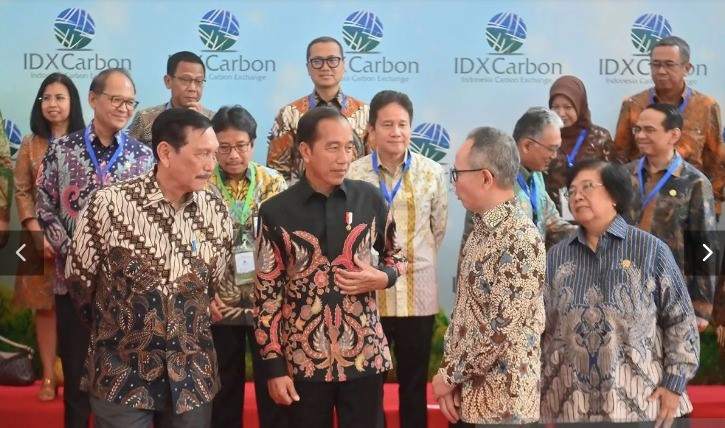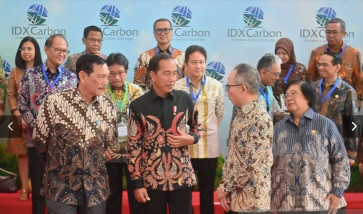Popular Reads
Top Results
Can't find what you're looking for?
View all search resultsPopular Reads
Top Results
Can't find what you're looking for?
View all search resultsIndonesia must be ready for EU's new green trade policies
Indonesia should capitalize on the EU's commitment to helping developing countries decarbonize by staying abreast of policy developments and designing rules that correspond with European standards.
Change text size
Gift Premium Articles
to Anyone
 Carbon talks: President Joko “Jokowi” Widodo (second left) speaks with Coordinating Maritime Affairs and Investment Minister Luhut Binsar Pandjaitan (left), head of the Financial Services Authority (OJK) Mahendra Siregar (second right) and Environment and Forestry Minister Siti Nurbaya Bakar (right) on Sept. 26, 2023, after inaugurating the Indonesian carbon exchange at the Jakarta Stock Exchange. (Antara/Akbar Nugroho Gumay)
Carbon talks: President Joko “Jokowi” Widodo (second left) speaks with Coordinating Maritime Affairs and Investment Minister Luhut Binsar Pandjaitan (left), head of the Financial Services Authority (OJK) Mahendra Siregar (second right) and Environment and Forestry Minister Siti Nurbaya Bakar (right) on Sept. 26, 2023, after inaugurating the Indonesian carbon exchange at the Jakarta Stock Exchange. (Antara/Akbar Nugroho Gumay)
T
he European Union recently introduced the Carbon Border Adjustment Mechanism (CBAM) as part of its trade policy to drive climate action. This measure imposes an import tax on certain products, such as iron, steel, cement, fertilizers, aluminum and electricity, to offset the carbon emissions produced during their manufacturing process.
Starting in 2026, companies importing these products will be required to purchase CBAM certificates. This move aims to level the playing field between foreign producers and EU industries, which already must buy permits from the EU carbon market and prevent carbon leakage in cases where European manufacturers relocate to countries with lower environmental standards.
The EU later expanded its carbon border levy to include agricultural products, permitting only deforestation-free and legal goods to enter the EU market under its deforestation law.
Imported products linked to deforestation and forest degradation, such as soybean, beef, palm oil, wood, cocoa and coffee, along with some derived products like leather, chocolate and furniture, will also need certification as a form of carbon charge.
The EU’s deforestation-free standard stipulates that products must originate from land that has not undergone deforestation since Dec. 31, 2020 and that this be indicated in due diligence by providing monitoring information, such as the geographical coordinates of farms or plantations.
A transitional phase from 2023 to 2025 precedes the full operation of the system in 2026. During this phase, importers must declare emissions but will not need to buy carbon allowances.
Many have perceived this approach as a move toward “green protectionism”, potentially sparking trade tensions and escalating disputes over green subsidies and carbon tariffs. These conflicts may be exacerbated by the limited ability of emerging market economies to compete in a subsidy-driven environment.


















